Description
You are given the head of a linked list.
The nodes in the linked list are sequentially assigned to non-empty groups whose lengths form the sequence of the natural numbers (1, 2, 3, 4, ...). The length of a group is the number of nodes assigned to it. In other words,
- The
1stnode is assigned to the first group. - The
2ndand the3rdnodes are assigned to the second group. - The
4th,5th, and6thnodes are assigned to the third group, and so on.
Note that the length of the last group may be less than or equal to 1 + the length of the second to last group.
Reverse the nodes in each group with an even length, and return the head of the modified linked list.
Example 1:

Input: head = [5,2,6,3,9,1,7,3,8,4] Output: [5,6,2,3,9,1,4,8,3,7] Explanation: - The length of the first group is 1, which is odd, hence no reversal occurs. - The length of the second group is 2, which is even, hence the nodes are reversed. - The length of the third group is 3, which is odd, hence no reversal occurs. - The length of the last group is 4, which is even, hence the nodes are reversed.
Example 2:

Input: head = [1,1,0,6] Output: [1,0,1,6] Explanation: - The length of the first group is 1. No reversal occurs. - The length of the second group is 2. The nodes are reversed. - The length of the last group is 1. No reversal occurs.
Example 3:

Input: head = [1,1,0,6,5] Output: [1,0,1,5,6] Explanation: - The length of the first group is 1. No reversal occurs. - The length of the second group is 2. The nodes are reversed. - The length of the last group is 2. The nodes are reversed.
Constraints:
- The number of nodes in the list is in the range
[1, 105]. 0 <= Node.val <= 105
Solution
Python3
# Definition for singly-linked list.
# class ListNode:
# def __init__(self, val=0, next=None):
# self.val = val
# self.next = next
class Solution:
def reverseEvenLengthGroups(self, head: Optional[ListNode]) -> Optional[ListNode]:
curr = head
k = 1
while curr:
count = 0
p = curr
stack = []
while curr and count < k:
stack.append(curr.val)
count += 1
curr = curr.next
if count % 2 == 0:
while p != curr:
p.val = stack.pop()
p = p.next
k += 1
return head